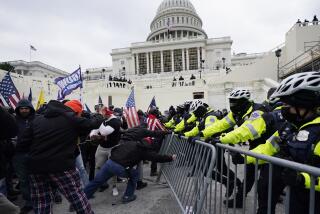Counterspy Efforts Hindered, Study Says : Senate Panel Reports Lack of Access to Bank, Telephone Records
- Share via
WASHINGTON — FBI agents, citing threats to the “national security,” recently asked a California bank to show them the financial records of a suspected spy. But the bank refused, fearing that complying would invite a lawsuit under state privacy laws, and the agents were powerless to force its hand without issuing a subpoena that might have alerted the suspect to their investigation.
The bank’s refusal to cooperate was no isolated case. The FBI has told Congress that banks have hampered counterintelligence investigations in “certain significant instances.”
And this is only one of several loopholes found by a Senate Intelligence Committee study to interfere with federal investigations of hostile spying. In the report, Committee Chairman Dave Durenberger (R-Minn.) and Vice Chairman Patrick J. Leahy (D-Vt.) conclude that enemy intelligence operations pose “a growing problem to national security. . . . Espionage cases of the last two years have involved billions of dollars of actual and potential damage to U.S. military programs.”
Findings Sent to White House
Preliminary findings from the year-long study, spurred by the recent flurry of sensational spy arrests, have been sent to the White House for comment. The committee hopes to finish a final report before the end of summer.
Financial records are high on the committee’s list of concerns. Their value in counterintelligence work was dramatized in the recent espionage trial of Ronald W. Pelton, the former employee of the super-secret National Security Agency who was found guilty of spying for the Soviet Union. He had filed for bankruptcy before he began selling information to the Soviets to help pay off his debts, and advance knowledge of his plight could have alerted U.S. officials that he was vulnerable to recruitment by the Soviets.
The Intelligence Committee has won Administration support for legislation to protect banks and other financial institutions from suits if they cooperate in national security investigations. It hopes the Senate will pass the legislation this summer.
Another loophole that has stymied the FBI counterspy efforts is refusal of some phone companies, mainly in California, to permit examination of the billing records of spy suspects. “It’s easier for the bureau to get permission to tap a suspect’s phone than to see billing records,” complained a committee staff member.
Court’s Power Is Limited
Authority to wiretap can be granted by the Foreign Intelligence Surveillance Court, a special court composed of seven federal district judges who review and approve surveillances that monitor U.S. citizens.
But that court cannot require telephone companies to open up billing data to federal agents. The committee is waiting for the White House to decide whether it would support legislation that would give counterintelligence agents access to telephone records.
Yet another measure proposed by the committee would give the FBI, as the nation’s chief counterintelligence agency, better access to state and local criminal records. That would aid in making background investigations and perhaps in turning a foreign spy into a double agent.
In its preliminary report, the committee also pressed the Administration to minimize the vulnerability of U.S. secrets to espionage. It urged, for example, that the White House order the encoding of a significant part of the phone calls and other data carried by domestic communication satellites. The aim would be to foil Soviet eavesdropping on transmissions to and from those satellites from listening posts at Lourdes, Cuba, on offshore ships and at diplomatic missions within the United States.
Would Limit Encrypting
The committee would limit the effect of the order to telephone lines leased by the government, by government contractors and by organizations that deal with economic transactions and forecasts. That would cut by more than half the $1-billion cost of encrypting all domestic satellite channels, as proposed by Sen. Daniel Patrick Moynihan (D-N.Y.), the committee’s former vice chairman.
The committee complained that the Administration lacks a broad policy for such matters as safeguarding technical equipment like computers, phones and other communications; ensuring that personnel with security clearances have been effectively investigated, and controlling the level of classification and distribution of sensitive documents.
Different practices exist in different offices within the same department, the committee’s study found. At the Pentagon, for example, equipment security is handled by one office while personnel and information issues fall under another.
Found Varying Standards
Likewise, the standards for safeguarding military secrets differ from those for safeguarding intelligence secrets, the Senate study found. Even criteria for granting top-secret clearances and handling top-secret information differ in the Defense Department and the CIA, staffers said.
The Senate committee, with support from the House Intelligence Committee, has been trying for years to force the Administration to recommend ways to improve the coordination of counterintelligence activities by the FBI, the CIA and the three military services.
Past calls for creating a single counterintelligence agency have foundered on fears that the resulting organization would be a “national police force” that would threaten civil liberties.
More to Read
Get the L.A. Times Politics newsletter
Deeply reported insights into legislation, politics and policy from Sacramento, Washington and beyond. In your inbox twice per week.
You may occasionally receive promotional content from the Los Angeles Times.










